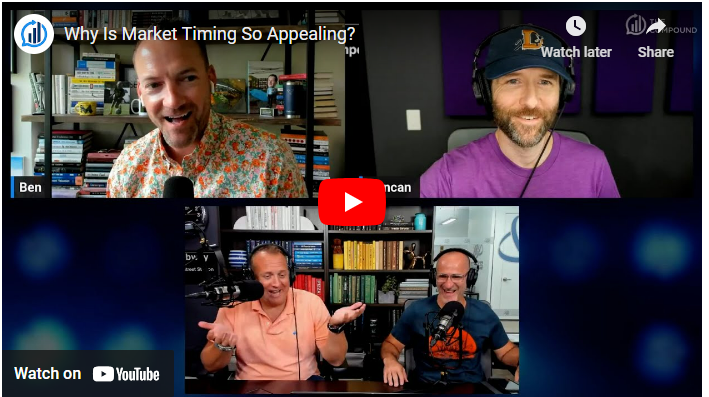A reader asks:
I find myself in the very situation I know I shouldn’t be in.
I’ve recently returned to living in the US from abroad (a country with a lot of US tax-treaties) – as of a few months ago. My equity investments had to be either sold or taxed (as if I sold them) as part of an “exit-tax” before departing. I sold some years-long holdings in index funds with substantial gains (not to brag). Let’s just say the amount would buy Michael many mudroom renovations. All this is now in cash or 4-week T-bills.
Why is it so hard not to be a market timer, and just dive right back into the same holdings? It was so much easier paycheck to paycheck, but now so much more difficult with the equivalent of a windfall event. Psychological tricks!
This is one of the reasons simulations and hypotheticals never come close to real world experience when it comes to managing your money.
When I opened my first brokerage account someone told me to trade a paper portfolio first before buying any individual stocks.
I quickly learned paper portfolios are worthless. You can’t simulate the feelings you get from making or losing money. Those paper buys and sells can’t recreate the fear of missing out or the regret you feel once a stock you own crashes.
Another piece of advice1 you’ll often hear goes something like this:
Imagine you were starting over today in all cash. Would you still own the same holdings? How different would your portfolio look?
These emotions cannot be reproduced either and few people ever get the opportunity to start investing with a clean slate.
But this person is actually going through this exercise for real! It’s like a psychological market experiment.
The boring advice here would be to simply invest the money back into the asset allocation and holdings you owned before the forced sale and do so immediately.
But I understand why there is some trepidation here.
When you’re sitting in cash there is an inescapable temptation to time the market.
What if I just hung out in cash here for a while to see if the market pulls back 5-10%? There’s no harm in that right?
The problem with this mindset is eventually that you turn into Gollum and the cash is your Precious.
The Siren Song of market timing is difficult to ignore under regular circumstances. The volume gets turned up all the way when you’re sitting on a pile of cash.
Part of the reason market timing is so appealing is the potential to profit. But like Michael says in Heat, “The action is the juice.” Sometimes we just can’t help it.
I do like the idea of reassessing your portfolio before redeploying. You already paid your exit tax so it’s at least worth considering if there are any changes that need to be made based on changes to your risk profile or time horizon.
I went through this exercise on a much smaller scale recently.
After the run-up in housing prices, my personal balance sheet was far too overweight real estate. So earlier this year I sold all of my shares in a real estate fund to rebalance and consolidate my accounts.
After liquidating the fund I was sitting on a reasonable amount of cash.
Going through that process did force me to stop and think about how I wanted to rebalance. It wasn’t a large change but I did over-rebalance into a few of the lagging areas of my portfolio.
You also have to think about how you redeploy your cash.
Under similar circumstances in the past when sitting on a lump sum, I’ve almost always invested it all at once.
If you have an asset allocation target in mind, why not get to that target as quickly as possible?
Yet this time I decided to dollar cost average back in over the course of a few months. I’m about halfway through this process. Considering the move we’ve experienced in the markets these past few months it might look like this decision was the wrong one.
But I knew what I was getting myself into when I put this plan in motion. Sometimes the markets go in your favor and sometimes they go against you. Investing itself is a form of regret minimization and I liked the idea of spreading my bets.
You win some, you lose some.
My biggest piece of advice here would be to simply make a plan and stick to it no matter what the market does.
The important thing when thinking through a decision like this is that you understand the psychological tricks the market can play on you upfront.
My friend Phil Pearlman once wrote, “Here’s the thing about behavioral economics. People are crazy.”
Emotions are what make us human. There is nothing we can do about the way our environment makes us feel at times.
This is why the best investment plans make good decisions ahead of time so you don’t allow your emotions to take the steering wheel at the worst possible times.
We discussed this question on the latest Ask the Compound:
On this week’s show, Josh Brown and Phil Pearlman joined me to talk about questions on gambling in your Roth IRA, talking finances with your partner, how to change bad health habits and much more.
Further Reading:
The Psychology of Sitting in Cash
1If I’m being honest I’ve probably used this advice in the past. Credit to me for changing my mind.
